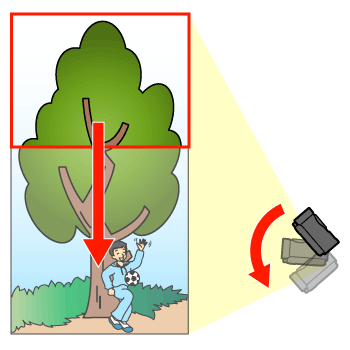Solution
When the scene you want to shoot is wider or taller than the lens can capture, you can move the camera left and right or up and down when shooting. The term "pan" means rotating the camera from left to right or right to left when shooting, and the term "tilt" means turning or rotating the camera up or down when shooting. This section describes both of these shooting techniques.
Panning to express a panoramic view
1. Determine the position where the shot should start and stop.
2. Stand facing directly to the position where the shot will stop, with the camera facing that direction.
3. Without moving your feet, twist the upper half of your body to face the position where the shot is to start, with the camera now facing in that direction.
4. Start shooting for a few seconds without moving the camera right away.
5. While being careful to avoid camera shake, slowly return the upper half of your body to the original position.
6. After reaching the position where the shot is to stop, remain still and continue to shoot for a few seconds.
7. Stop or suspend shooting.
Tilting to express height
When you want to express the height of trees or buildings, the height in your footage will be emphasized if you rotate the camera from the top of the scene slowly down to the bottom.
When you shoot a subject that is 2 - 3 meters-height, you can emphasize the height by doing the opposite: rotating the camera upward from the bottom.
<Shooting points>
*Do not move your feet when shooting.
*Record a stationary scene for a few seconds at the positions where the shot starts and stops.
It is advisable to use a camcorder tripod when using panning or tilting in your shots. The tripod can fix the horizontal level and has a handle that you can use to move the camera easily from right to left or up and down, making it possible to shoot stable images without camera shake.

